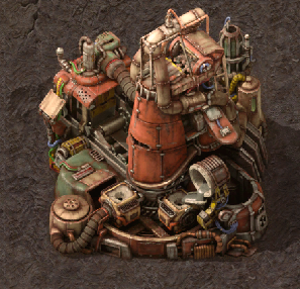Foundry: Difference between revisions
Thrawcheld (talk | contribs) (correct name: assembling, not assembly; spacing) |
(→Efficiency: Added an important section on Low density structure.) |
||
| (One intermediate revision by one other user not shown) | |||
| Line 96: | Line 96: | ||
|- | |- | ||
|} | |} | ||
Note that the recipe for making concrete can use [[Productivity module]]s, despite the regular [[Concrete]] recipe not being able to use prods. | |||
Additionally, the Foundry can also make other foundries, all belt types and {{NavboxIconLink|Holmium plate|holmium plates}}, in which case their recipes are the same as with assembling machines. | Additionally, the Foundry can also make other foundries, all belt types and {{NavboxIconLink|Holmium plate|holmium plates}}, in which case their recipes are the same as with assembling machines. | ||
| Line 273: | Line 275: | ||
| 450% | | 450% | ||
|- | |- | ||
|} | |||
=== Low density structure === | |||
The numbers in the table are relative to using Electric furnaces. However it is possible to use the highly efficient Foundries to make the intermediates, which requires even less ore, but more plastic: | |||
{| class="wikitable" | |||
|- | |||
! Process | |||
! Raw resources to make {{icon|Low density structure|1}} | |||
|- | |||
| Furnaces + Assemblers | |||
| {{icon|Iron ore|10}} {{icon|Copper ore|20}} {{icon|Plastic bar|5}} | |||
|- | |||
| Foundry Direct | |||
| {{icon|Iron ore|3.5}} {{icon|Copper ore|11.1}} {{icon|Plastic bar|3.33}} | |||
|- | |||
| Foundries + Assemblers | |||
| {{icon|Iron ore|2.67}} {{icon|Copper ore|8.88}} {{icon|Plastic bar|5}} | |||
|} | |} | ||
Latest revision as of 11:17, 17 November 2024
| Foundry |
|
Recipe |
|||||||||||||
| +++++ → | |||||||||||||
|
Total raw |
|||||||||||||
| +++++ | |||||||||||||
|
Map color |
|||||||||||||
|
Health |
|
||||||||||||
|
Stack size |
20 |
||||||||||||
|
5 |
|||||||||||||
|
Dimensions |
5×5 |
||||||||||||
|
Energy consumption |
2500 kW (electric) |
||||||||||||
|
Drain |
83.33 kW (electric) |
||||||||||||
|
Crafting speed |
|
||||||||||||
|
Mining time |
0.2 |
||||||||||||
|
Base productivity |
50% |
||||||||||||
|
Pollution |
6/m |
||||||||||||
|
Module slots |
4 slots |
||||||||||||
|
Prototype type |
|||||||||||||
|
Internal name |
foundry |
||||||||||||
|
Required technologies |
|||||||||||||
|
Produced by |
|||||||||||||
| This article is a stub, and not comprehensive. |
|---|
| You can help this wiki by expanding it. |
![]() Space Age expansion exclusive feature.
Space Age expansion exclusive feature.
The Foundry is a version of the assembling machine from Vulcanus![]() that specializes in metallurgy. It has a built-in 50% productivity bonus.
that specializes in metallurgy. It has a built-in 50% productivity bonus.
The foundry can only be crafted on Vulcanus due to its higher atmospheric pressure, but it can be used on other planets once transported via space platform.
Recipes
The Foundry has twenty available unique recipes, of which one must be set before it can begin processing.
Note that the recipe for making concrete can use Productivity modules, despite the regular Concrete recipe not being able to use prods.
Additionally, the Foundry can also make other foundries, all belt types and holmium plates, in which case their recipes are the same as with assembling machines.
Efficiency
Most of the foundry's recipes are more efficient than creating the same items in a furnace or assembling machine. However, because of the built-in +50% productivity bonus (which applies even to items like belts that don't benefit from productivity modules), and because the same bonus also applies to the recipes for molten iron and molten copper, the actual efficiency gains from using a foundry are much higher than the value listed in the recipe.
The table below compares the values of the base recipes (with 1 ore = 10 molten metal), and then shows the actual output of the recipe with the default foundry bonuses of 4 crafting speed and 150% productivity (1 ore = 15 molten metal). For example, inserting 200 iron ore into a foundry with no modules installed would result in 3,000 molten iron which could be turned into 450 iron plates.
| Name | Base recipe values | With foundry bonuses | ||||||||||||
|---|---|---|---|---|---|---|---|---|---|---|---|---|---|---|
| Furnace/Assembler | Foundry | Efficiency | Foundry | Efficiency | ||||||||||
| Time | Output | Time | Output | Time | Output | |||||||||
| Iron plate | - | - | 100% | - | 225% | - | ||||||||
| Steel plate | - | - | 167% | - | 375% | - | ||||||||
| Iron gear wheel | - | - | 200% | - | 450% | - | ||||||||
| Iron stick | - | - | 100% | - | 225% | - | ||||||||
| Concrete | - | - | 50% | - | 113% | - | ||||||||
| Pipe | - | - | 100% | - | 225% | - | ||||||||
| Pipe to ground | - | - | 100% | - | 225% | - | ||||||||
| Low density structure | 125% | 80% | 281% | 180% | ||||||||||
| Copper plate | - | - | - | 100% | - | 225% | ||||||||
| Copper cable | - | - | - | 200% | - | 450% | ||||||||
Low density structure
The numbers in the table are relative to using Electric furnaces. However it is possible to use the highly efficient Foundries to make the intermediates, which requires even less ore, but more plastic:
| Process | Raw resources to make |
|---|---|
| Furnaces + Assemblers | |
| Foundry Direct | |
| Foundries + Assemblers |
